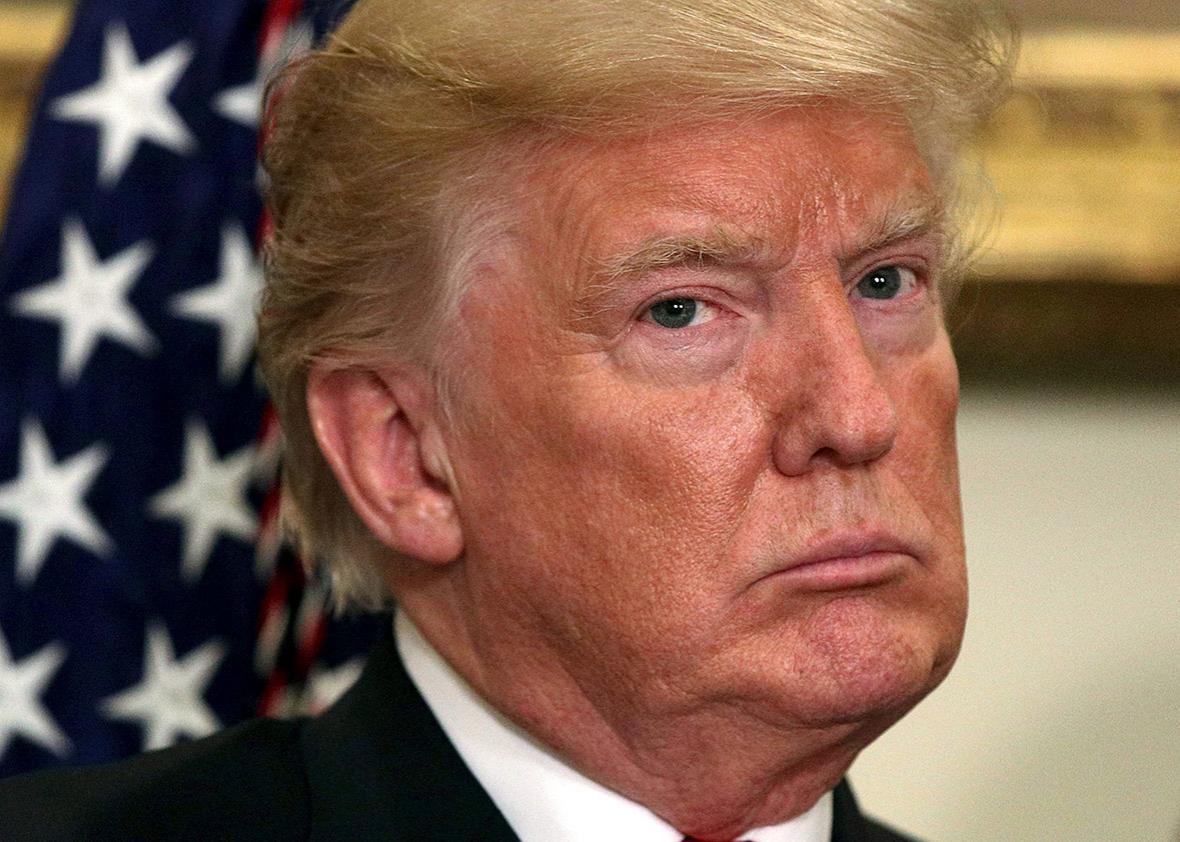The Washington Post reported on Thursday that President Donald Trump has been asking advisers about his power to pardon aides, family members, and even himself. It’s fair to say that such efforts by the president would lead to a full-scale constitutional crisis and potentially mass protests in the streets. If the Republican Party failed to initiate impeachment proceedings in the face of a string of pardons meant to protect the president and his inner circle, might there be any possible consequences for Trump? Constitutional scholars say yes: If Trump abuses his presidential powers to pardon in a way that obstructs justice, he could be prosecuted under a future administration.
The question of what to do about a president who abuses his pardon power was one the Founding Fathers took very seriously. George Mason was one of the few delegates to the Constitutional Convention who refused to sign the Constitution. One of his objections was that the pardon power as written seemed to be unfettered. He wrote:
The President of the United States has the unrestrained power of granting pardons for treason, which may be sometimes exercised to screen from punishment those whom he had secretly instigated to commit the crime, and thereby prevent a discovery of his own guilt.
Sound familiar?
Other Founding Fathers responded to this critique by saying that such a hypothetical president could not use the power of the pardon to get away with such criminality. James Iredell, one of the earliest Supreme Court justices, doubted that any president would ever do something so scurrilous, comparing such actions to those of the traitorous Benedict Arnold. “‘[T]he improbability of a man honored in such a manner by his country, risquing, like General Arnold, the damnation of his fame to all future ages” made such a case unlikely, he wrote in response to Mason. In the event that it did happen, though, the president could face consequences. “If a President should pardon an accomplice, that accomplice then would be an unexceptionable witness,” Iredell wrote.
James Madison agreed. “If the President can be connected, in any suspicious manner, with any person, and there be grounds to believe he will shelter him, the House of Representatives can impeach him,” he wrote in his own response to Mason. This argument was cited by at least one Republican senator in the impeachment trial of President Bill Clinton to argue that obstruction of justice constituted a “high crime” for impeachment purposes.
It’s clear the Founding Fathers felt impeachment was the safeguard against using the pardon as an attempted criminal cover-up. A majority of the House would need to vote for impeachment for a proceeding to begin in the Senate, whereupon a two-thirds majority would need to find the president guilty for him to be removed from office. Given that both bodies are controlled by the GOP, this seems like an unlikely course of events. However, constitutional scholars believe that, even if the Republican-controlled legislature failed to initiate impeachment proceedings, a future Justice Department could prosecute cases based on a former president’s use of the pardon.
“The fact that a person can be fired for any reason or pardoned for any reason does not mean that in certain circumstances the reason might not constitute obstruction of justice,” former U.S. Solicitor General Walter Dellinger told me. Dellinger also discounted the idea that the Mason-Iredell exchange implied that the president had unlimited pardon power, including the power to pardon himself. “You just don’t know what anybody else at the convention thought about that back and forth,” he said. Writing in the New York Times on Friday, constitutional scholars Eric Posner and Daniel Hemel agreed that Trump could be prosecuted for any such pardons were they to constitute obstruction of justice. They wrote:
If it could be shown that President Trump pardoned his family members and close aides to cover up possible crimes, then that could be seen as acting “corruptly” and he could be charged with obstruction of justice. If, as some commentators believe, a sitting president cannot be indicted, Mr. Trump could still face prosecution after he leaves the White House.
Posner and Hemel cite the precedent of the Justice Department and FBI’s investigation of President Bill Clinton for possible bribery on account of his pardon of Marc Rich. (Clinton ultimately was not charged with a crime.) If an ex-president can be investigated for potential federal bribery for a potentially abusive pardon, the thinking goes, he can be charged with obstruction of justice for a potentially abusive pardon. Margaret Colgate Love, the U.S. pardon attorney from 1990 to 1997 and one of the foremost experts on presidential pardons, agreed with that assessment. “If he pardoned for money or pardoned corruptly, I would think that that could be prosecuted,” she told me. “I don’t think that he could do whatever he wants with the pardon power. He obviously can’t accept money for a pardon.”
Pre-emptive wide-ranging pardons for possible accomplices might not just place the president in great political and legal jeopardy. They could also be very difficult to pull off as a practical matter. President Gerald Ford had a specific period of time in mind when he pre-emptively pardoned his predecessor Richard Nixon for crimes possibly committed during the duration of his presidency. “Here it would be very hard to know how to craft such a pardon,” Dellinger said. “Could you really define it to include all manner of financial crimes that may have been committed by a large number of people for an indefinite amount of time? That would be a truly shocking expanse.”
